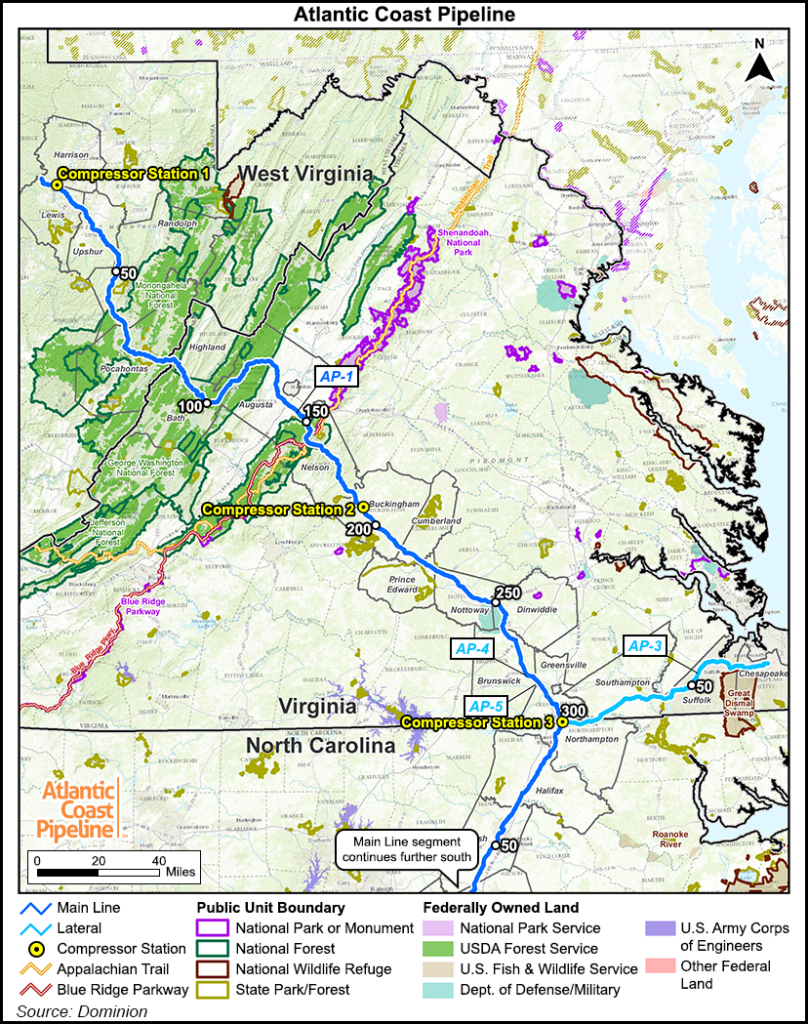Regulatory | Infrastructure | NGI All News Access
ACP Construction to Restart After FERC Lifts Stop Work Order
FERC on Monday lifted a stop work order it issued more than a month ago for the Atlantic Coast Pipeline (ACP), clearing the way for construction to restart along the 600-mile route.

Office of Energy Projects Director Terry Turpin signed off on the project’s restart after the National Park Service (NPS) and the U.S. Fish and Wildlife Service (FWS) modified key permits last week in response to the U.S. Court of Appeals for the Fourth Circuit’s decision to vacate them.
The FWS issued a revised biological opinion (BO) and a modified incidental take statement, while the NPS issued a new right-of-way (ROW) permit for crossing the Blue Ridge Parkway, which links the Shenandoah National Park in Virginia to the Great Smoky Mountains National Park in North Carolina. The incidental take permit is required for activities that could result in the take of, or negative impact to, threatened wildlife.
“With FERC’s approval today, we are mobilizing our crews immediately to resume construction as authorized,” said ACP spokesman Aaron Ruby. “We are closely monitoring weather conditions across the project footprint and will of course only resume work in areas where it safe to do so and where weather conditions permit,” he added of the inclement weather throughout the region from Hurricane Florence, now a tropical depression.
Before construction can resume, Turpin said, ACP must provide written correspondence from the U.S. Forest Service (USFS) and the Army Corps of Engineers showing that the modified permits are consistent with other authorizations for ACP from those agencies.
“Construction activities along the project areas which had previously received a notice to proceed may now continue,” Turpin said in a letter to sponsor Dominion Energy Transmission Inc. (DETI). “Atlantic and DETI are required to comply with the reasonable and prudent alternatives, terms and conditions, monitoring and reporting requirements, and conservation recommendations set forth in the BO.”
The Fourth Circuit vacated ACP’s incidental take statement, forcing the company to stop work in May on about 100 miles of the system in West Virginia and Virginia. The court found that FWS failed to set adequate limitations on the harm the project might cause five threatened or endangered species.
The court later found that the NPS failed to explain how its approval of the ROW was consistent with its conservation duties under the Blue Ridge Parkway Organic Act. While project construction wouldn’t disturb the parkway’s ROW, as it would be installed beneath the surface, a 125-foot construction corridor would need to be cleared in what the court said would affect views from the parkway’s scenic overlooks.
Not all work had stopped, as ACP’s plan to stabilize the route during the suspension was approved by the Federal Energy Regulatory Commission. That work was complicated as Florence neared landfall last week, forcing the company to make preparations.
ACP would originate in West Virginia, pass through Virginia and into North Carolina to move 1.5 Bcf/d of Appalachian natural gas to the Southeast. The project, backed by DETI, Duke Energy Corp., Piedmont Natural Gas and Southern Company Gas, is still targeting a 2019 in-service date, Ruby said.
The similarly routed Mountain Valley Pipeline was also ordered to halt all work last month. In that case, the Fourth Circuit vacated decisions by the USFS and the Bureau of Land Management that allowed MVP to cross a 3.5 mile segment of the Jefferson National Forest in Virginia and West Virginia. But most of the order was later lifted by FERC and work has resumed.
© 2024 Natural Gas Intelligence. All rights reserved.
ISSN © 1532-1231 | ISSN © 2577-9877 |
